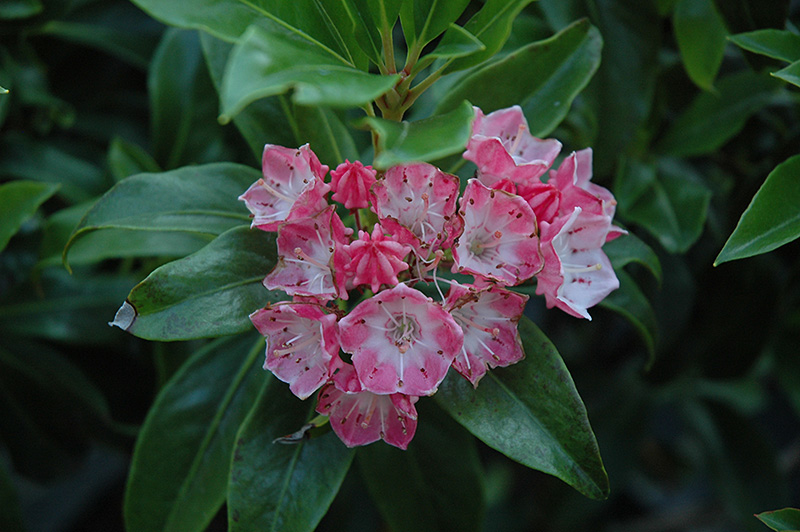Olympic Fire Mountain Laurel
Kalmia latifolia 'Olympic Fire'
Height: 15 feet
Spread: 15 feet
Sunlight:
![]()
![]()
![]()
Hardiness Zone: 5a
Description:
An incredible spring blooming broadleaf evergreen shrub with amazing frilled red buds opening to pink flowers and colorful emergent foliage; requires exacting conditions, must have superbly drained highly acidic and organic soil with a heavy mulch
Ornamental Features
Olympic Fire Mountain Laurel features showy clusters of pink cup-shaped flowers at the ends of the branches from mid to late spring, which emerge from distinctive dark red flower buds. It has attractive dark green evergreen foliage which emerges burgundy in spring. The glossy pointy leaves are highly ornamental and remain dark green throughout the winter.
Landscape Attributes
Olympic Fire Mountain Laurel is a dense multi-stemmed evergreen shrub with a more or less rounded form. Its average texture blends into the landscape, but can be balanced by one or two finer or coarser trees or shrubs for an effective composition.
This is a relatively low maintenance shrub, and should only be pruned after flowering to avoid removing any of the current season's flowers. It has no significant negative characteristics.
Olympic Fire Mountain Laurel is recommended for the following landscape applications;
- Mass Planting
- General Garden Use
Planting & Growing
Olympic Fire Mountain Laurel will grow to be about 15 feet tall at maturity, with a spread of 15 feet. It has a low canopy with a typical clearance of 1 foot from the ground, and is suitable for planting under power lines. It grows at a slow rate, and under ideal conditions can be expected to live for 50 years or more.
This shrub performs well in both full sun and full shade. It requires an evenly moist well-drained soil for optimal growth, but will die in standing water. It is very fussy about its soil conditions and must have rich, acidic soils to ensure success, and is subject to chlorosis (yellowing) of the foliage in alkaline soils. It is somewhat tolerant of urban pollution, and will benefit from being planted in a relatively sheltered location. Consider applying a thick mulch around the root zone in winter to protect it in exposed locations or colder microclimates. This is a selection of a native North American species.

